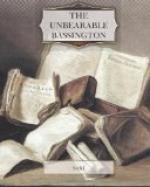“The dear Archdeacon is getting so absent-minded. He read a list of box-holders for the opera as the First Lesson the other Sunday, instead of the families and lots of the tribes of Israel that entered Canaan. Fortunately no one noticed the mistake.”
CHAPTER V
On a conveniently secluded bench facing the Northern Pheasantry in the Zoological Society’s Gardens, Regent’s Park, Courtenay Youghal sat immersed in mature flirtation with a lady, who, though certainly young in fact and appearance, was some four or five years his senior. When he was a schoolboy of sixteen, Molly McQuade had personally conducted him to the Zoo and stood him dinner afterwards at Kettner’s, and whenever the two of them happened to be in town on the anniversary of that bygone festivity they religiously repeated the programme in its entirety. Even the menu of the dinner was adhered to as nearly as possible; the original selection of food and wine that schoolboy exuberance, tempered by schoolboy shyness, had pitched on those many years ago, confronted Youghal on those occasions, as a drowning man’s past life is said to rise up and parade itself in his last moments of consciousness.
The flirtation which was thus perennially restored to its old-time footing owed its longevity more to the enterprising solicitude of Miss McQuade than to any conscious sentimental effort on the part of Youghal himself. Molly McQuade was known to her neighbours in a minor hunting shire as a hard-riding conventionally unconventional type of young woman, who came naturally into the classification, “a good sort.” She was just sufficiently good-looking, sufficiently reticent about her own illnesses, when she had any, and sufficiently appreciative of her neighbours’ gardens, children and hunters to be generally popular. Most men liked her, and the percentage of women who disliked her was not inconveniently high. One of these days, it was assumed, she would marry a brewer or a Master of Otter Hounds, and, after a brief interval, be known to the world as the mother of a boy or two at Malvern or some similar seat of learning. The romantic side of her nature was altogether unguessed by the countryside.
Her romances were mostly in serial form and suffered perhaps in fervour from their disconnected course what they gained in length of days. Her affectionate interest in the several young men who figured in her affairs of the heart was perfectly honest, and she certainly made no attempt either to conceal their separate existences, or to play them off one against the other. Neither could it be said that she was a husband hunter; she had made up her mind what sort of man she was likely to marry, and her forecast did not differ very widely from that formed by her local acquaintances. If her married life were eventually to turn out a failure, at least she looked forward to it with very moderate expectations. Her love affairs she put on a




